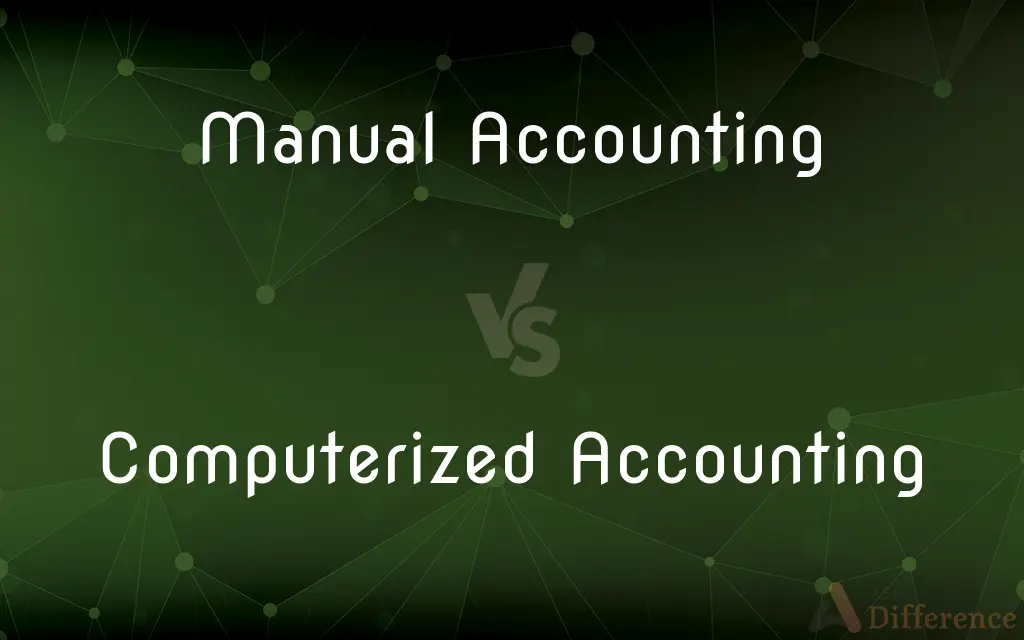Manual Accounting vs. Computerized Accounting — What's the Difference?
Edited by Tayyaba Rehman — By Fiza Rafique — Published on November 29, 2023
Manual Accounting means recording and managing financial data by hand. Computerized Accounting utilizing software and technology for financial data management.

Difference Between Manual Accounting and Computerized Accounting
Table of Contents
ADVERTISEMENT
Key Differences
Manual Accounting signifies a traditional method where financial transactions are recorded and managed by hand. On the other side, Computerized Accounting leverages technology, utilizing software to manage, record, and analyze financial data, showcasing a divergence in methodology.
The allure of Manual Accounting often rests in its simplicity and tangible control over the records, while Computerized Accounting draws businesses with its efficiency, speed, and minimized potential for human error, illustrating contrasting practical attributes.
In Manual Accounting, practitioners might encounter difficulty in retrieving and analyzing data swiftly due to physical record-keeping. In contrast, Computerized Accounting affords users swift data retrieval and in-depth, speedy analysis capabilities, highlighting a distinction in data accessibility and analysis.
The security of Manual Accounting primarily leans on physical safeguarding methods, whereas Computerized Accounting enables comprehensive data backups and electronic security measures, presenting a divergence in data protection approaches.
Manual Accounting often demands substantial time for meticulous data entry and calculations. Conversely, Computerized Accounting permits automated calculations and rapid data entry, indicating a stark contrast in time management and operational efficiency.
ADVERTISEMENT
Comparison Chart
Methodology
Involves physical, hand-kept records
Utilizes software for record-keeping
Efficiency
Generally time-consuming
Significantly more efficient
Data Retrieval
Can be slow and laborious
Typically swift and straightforward
Security
Relies on physical safeguards
Employs electronic backups and security
Error Margin
Higher due to human involvement
Lower due to automated calculations
Compare with Definitions
Manual Accounting
Keeping financial records with handwritten methods.
Invoices were recorded using manual accounting in the ledger.
Computerized Accounting
Managing financial data using specialized software.
Computerized accounting enabled efficient budget tracking.
Manual Accounting
Managing financial transactions with tangible materials.
Using manual accounting, she documented expenses in a notebook.
Computerized Accounting
Automated handling and storage of financial information.
Computerized accounting allowed automatic payroll processing.
Manual Accounting
Recording financial data without technological aid.
The ledger was updated through manual accounting practices.
Computerized Accounting
Performing accounting operations electronically.
He generated the financial reports through computerized accounting.
Manual Accounting
Utilizing physical tools for financial management.
She used manual accounting to balance the company books.
Computerized Accounting
Ensuring financial data management with electronic tools.
With computerized accounting, monthly reconciliation became swift.
Manual Accounting
Performing financial calculations without software.
Manual accounting required him to meticulously calculate taxes.
Computerized Accounting
Utilizing technology for financial data analysis.
Computerized accounting afforded rapid financial analysis.
Common Curiosities
Is manual accounting typically more time-consuming?
Yes, due to the physical nature of record-keeping and calculations.
What’s a hallmark of computerized accounting?
The utilization of software for managing financial data.
Can computerized accounting enhance data security?
Yes, via electronic backups and various digital security measures.
Is software always required for computerized accounting?
Yes, it involves using software or platforms for accounting tasks.
What’s a potential drawback of manual accounting?
It may limit swift data retrieval and comprehensive analysis.
Does manual accounting require specific software knowledge?
No, it predominantly involves traditional record-keeping skills.
Is manual accounting accessible without electricity?
Yes, it doesn’t rely on electronic platforms and can be conducted offline.
Can manual accounting be more error-prone?
Yes, human error in calculations and entries can be more prevalent.
Can computerized accounting facilitate financial forecasting?
Yes, through swift data analysis and reporting capabilities.
What distinguishes manual accounting?
The use of hand-kept records and physical data management.
How does computerized accounting impact business efficiency?
It often enhances efficiency through rapid data management and analysis.
Can computerized accounting integrate with other business systems?
Yes, many accounting software can integrate with various business tools.
Is computerized accounting typically more cost-effective?
Often yes, due to its enhanced efficiency and automation capabilities.
How is data backed up in manual accounting?
Typically through physical copies, which can be laborious.
How user-friendly is computerized accounting for non-accountants?
Varies, but many modern software are designed for user-friendliness.
Share Your Discovery

Previous Comparison
Stepsister vs. Half-Sister
Next Comparison
Imitation Jewellery vs. Artificial JewelleryAuthor Spotlight
Written by
Fiza RafiqueFiza Rafique is a skilled content writer at AskDifference.com, where she meticulously refines and enhances written pieces. Drawing from her vast editorial expertise, Fiza ensures clarity, accuracy, and precision in every article. Passionate about language, she continually seeks to elevate the quality of content for readers worldwide.
Edited by
Tayyaba RehmanTayyaba Rehman is a distinguished writer, currently serving as a primary contributor to askdifference.com. As a researcher in semantics and etymology, Tayyaba's passion for the complexity of languages and their distinctions has found a perfect home on the platform. Tayyaba delves into the intricacies of language, distinguishing between commonly confused words and phrases, thereby providing clarity for readers worldwide.
















































